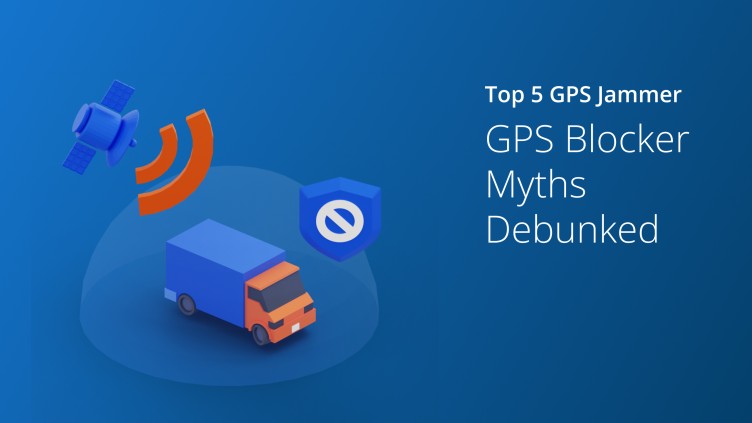Managing a field service business comes with its own set of struggles.
Ensuring driver safety, cutting fuel costs, managing on-time deliveries, and asset tracking are just some of the issues that worry most fleet managers.
Although Global Positioning System-based (GPS) trackers are making the work of field service managers easier by enabling efficiencies on the road, the technology itself is not safe from tampering.
For example, what do pilots losing air navigation signals, ships in the sea showing incorrect locations, and delivery drivers avoiding tolls have in common? All three situations involved a GPS jammer that tampered with or blocked GPS signals.
Table of Contents
What Is Jamming?
Currently managed by the U.S. Air Force, GPS is a radio-navigation system that uses the Global Navigation Satellite System (GNSS) network to use time data sent from dozens of satellites in space equipped with atomic clocks. Each satellite transmits signals, and the GPS receivers on the earth use these signals to communicate their locations.
An occasional satellite malfunction may disrupt these signals, but a more intentional cause would be GPS signal jamming devices. A GPS jamming device gets plugged into a vehicle’s cigarette lighter port and works by broadcasting noise on the same frequency the satellites use.
In this way, the GPS receivers cannot pick up the satellite signals. Depending on the strength of the GPS blocker, it can override the GPS reception for a few miles or yards.
Want To See For Yourself How Route4Me Can Help Track Your Vehicles?

Myths About GPS Jammers
Most field service reps know the regulations and penalties for using a GPS blocker app to manipulate their location or driving log. Yet, some drivers and representatives who do not want to be tracked by their managers use GPS jammers. These actions can have a more significant impact.
Below are five common myths that are not true.
#1 The Use of a GPS Jammer Is Exclusive to Rich Criminals
Fact: This myth is far from the truth. GPS affects our daily lives as new vehicles and mobile devices have GPS capability installed. And GPS signal jammers are so common that you can find them on eBay for less than $50.
The worst part is that anyone can buy and install these jammers, which puts their GPS-reliant navigational system (built-in on their iPhone, for instance) at risk.
For example, you are using Google Maps to locate a specific destination. Signal interference from a GPS jammer can mislead you to a different destination or shut down your app altogether. The fact that GPS jammers are easy to use escalates their potential danger even further.
#2 I Only Use GPS Jamming Devices to Hide My Location from My Manager
Fact: A jammer device, also known as a signal jammer, may seem harmless at first. However, its potential to cause harm is substantial. These jammers can potentially disrupt critical communications services, such as ambulances, police, 911, and firefighters.
Therefore, it is no surprise that, in the United States, the manufacturing, sale, distribution, and possession of GPS jammers is a federal crime, with punishment ranging from hefty fines and seizure of the jamming device to prison time.
#3 It Is Legal to Install Jamming Devices That Claim to Block GPS Signals of My Vehicle Only
Fact: Any devices that block GPS signal by emitting or interfering with radio frequency signals is illegal and cannot be marketed or operated in the United States except in the limited context of authorized use by the government.
Since it is difficult to determine how a device functions from an advertisement, you must contact the FCC’s Enforcement Bureau if you have any questions.
If a radio-transmitting device is not authorized by the FCC or is not labeled with an FCC identification number, people cannot legally operate it.
#4 Using a GPS Jammer Will Make My Current Location Invisible
Fact: The managers will know if field service reps use GPS jammers to manipulate their cell phone location data and block GPS tracking.
While drivers might think the jammers will make them invisible, their sneaky on-road behavior will attract even more attention.
So, if a driver using a mobile route planning app tries to prevent a GPS tracker by using a jammer, the vehicle will not disappear; it will still appear on the live map as a missing trip.
Also, when the drivers plug their jammers in a cigarette lighter port during the journey, you will see a line from when the jamming started.
If you are wondering how to detect GPS jammers in your vehicles, you can create an exception rule in your multi-stop navigation app that looks for GPS signal faults and sends an alert when interference occurs.
Multi-Stop Route Planner App

#5 If My Vehicle’s Location Shows Incorrectly on the Map, Will My Manager Think I Am Using a GPS Jammer?
Fact: No. An interrupted signal may not necessarily mean that you are using a GPS jammer. GPS signals are often not dependent on weather conditions. However, accuracy might be slightly altered in areas without a clear line of sight to the sky, such as over-populated areas, inside tunnels, or sometimes underneath bridges.
According to the GPS.gov website, in normal circumstances, GPS trackers are accurate 95% of the time within 16 feet. Some route planners have built-in GPS tracking.
Frequently Asked Questions (FAQs) about GPS Jammers
Are GPS jammers illegal?
Do GPS jammers really work?
Conclusion About GPS Jammers
While there is no conclusive research on the number of drivers using GPS jammers to hide their locations from their employers, their use is rising. And even though most drivers do not use jammers to conceal illegal activities, these devices interfere with critical communication systems related to public safety.
So, if you are worried your drivers might be using jamming devices, it is essential to monitor and confront them if you notice any suspicious activity. Better education for drivers on the benefits of GPS tracking systems and the hazards of using jamming devices may help make our roads much safer.
Want To See For Yourself How Route4Me Can Help Track Your Vehicles?




